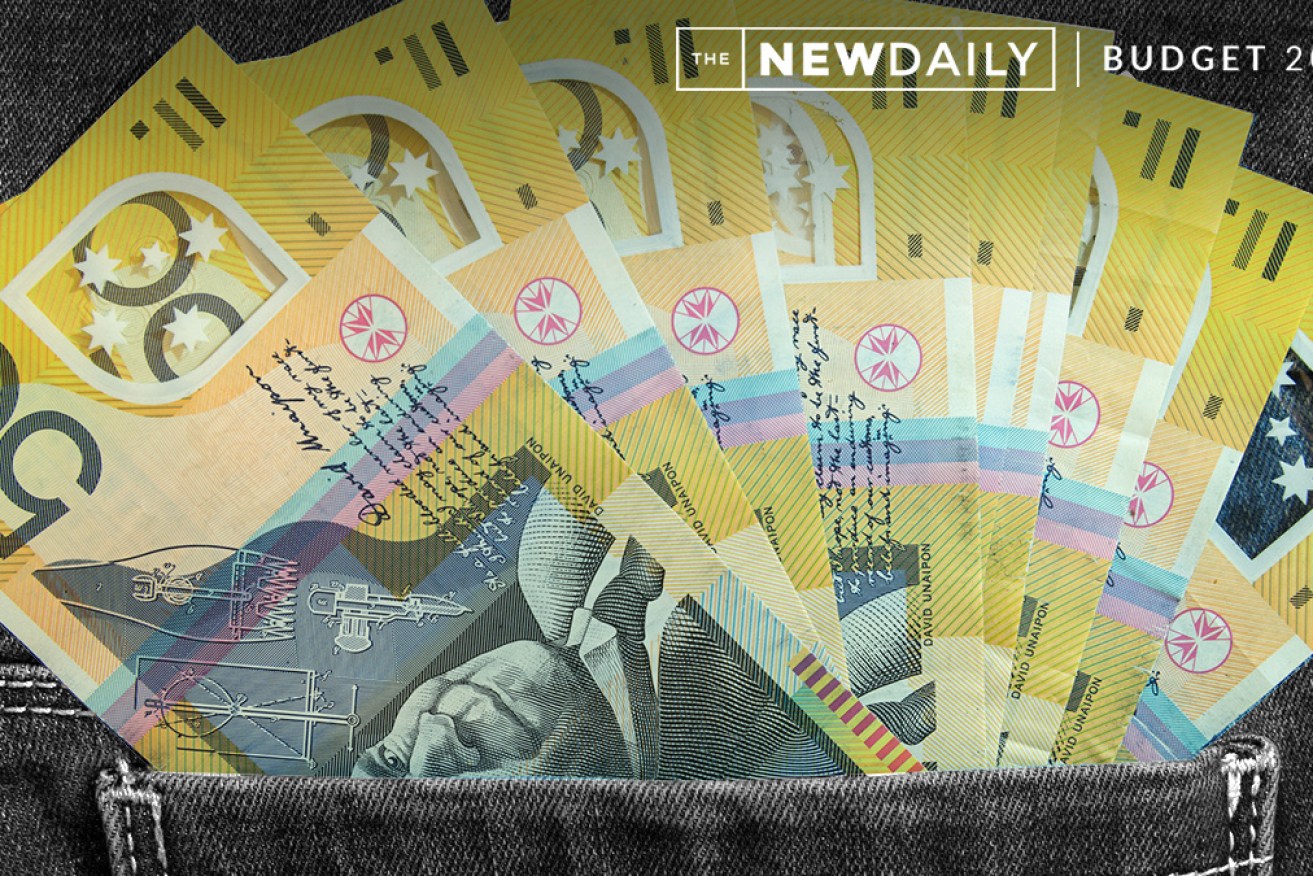Federal budget 2020: What Treasury’s night of nights means for Australians


Here's what the 2020 federal budget means for Australians. Photo: The New Daily
In a year of a pandemic, a recession and uncertainty on multiple levels, the 2020 budget was billed as the biggest budget since the Second World War.
On Tuesday night, Treasurer Josh Frydenberg opened the government’s wallet with spending on an unprecedented level in a bid to address the economic carnage of COVID-19 and “deal with the greatest challenge of our time”.
This is how the big-spending 2020 federal budget will affect average Australians.
Tax cuts
About 11.6 million Australians will benefit from fast-tracked tax cuts, with roughly seven million of those set to save $2000 or more this year when compared to the 2017-18 financial year.
But compared to the previous financial year, the tax cuts are actually worth about $1080 a year, or $20 a week, to most workers.
The cuts were originally due to start on July 1, 2021 and formed stage 2 of the federal government’s tax reforms introduced in the 2019 budget.
Under the changes, the upper income thresholds for the 19 per cent and 32.5 per cent tax brackets will be increased.
The cuts will be backdated to July 1, 2020 – meaning workers will see their taxes drop as soon as the legislation is passed and receive a lump sum when they file their 2021 tax return, to make up for the higher tax rate they have paid since July 1.
Mr Frydenberg said the cuts will pump billions into the economy and create 50,000 jobs, although previous research from Deloitte Access Economics suggests cuts will do little to stimulate the economy.
Young Australians
Australians aged 16 to 35 will be helped into jobs by a new ‘JobMaker hiring credit’ for employers.
Businesses (excluding major banks) that hire young Australians receiving JobSeeker will be entitled to payments of $200 per week (for new hires aged 16 – 29) or $100 per week (for ages 30 – 35).
The new hires will need to work a minimum of 20 hours each week to qualify for the credit.
 Further support is available to businesses taking on apprentices and trainees under a previously announced $1.2 billion wage subsidy scheme.
Further support is available to businesses taking on apprentices and trainees under a previously announced $1.2 billion wage subsidy scheme.
Up to 100,000 new apprentices will receive a 50 per cent wage subsidy from the federal government, regardless of the occupation, industry, or size of employer.
The First Home Loan Deposit Scheme – predominantly used by young Australians – will also be expanded by 10,000 places.
Older Australians
The federal government will spend $1.6 billion over four years to create 23,000 additional home care packages for older Australians.
Mr Frydenberg noted this is the largest single increase to home care in Australian history.
Age pensioners will also receive a $250 support payment in December and a second payment in March 2021.
The handouts follow similar coronavirus support payments of $750 made in April and July as the pandemic hit its peak.
A further $11.3 million will be spent in 2020-21 on additional dementia services and training programs.
And $10.3 million will be spent over three years to implement the Aged Care Workforce Strategy created by the Aged Care Workforce Industry Council.
 Transport
Transport
From 2020-21 onwards, the federal government will pump billions of dollars into priority road and rail projects across the country.
These include key projects such as upgrades to Victoria’s Shepparton and Warrnambool train lines, New South Wales’ Singleton bypass, and South Australia’s Main South Road duplication.
A further $2 billion will be spent over two years on road safety projects, such as road widening and adding barriers.
And $1 billion will be provided to councils for local road, footpaths and street lighting upgrades.
Super fund members
Workers switching jobs will no longer have new superannuation accounts created for them by their employers.
The reforms are designed to reduce the number of duplicate accounts in the system.
The six million existing duplicate accounts cost workers $450 million annually in unnecessary fees.
The government will also launch a new online comparison tool – called ‘YourSuper’ – to help members find the best fund for their needs.
Treasury estimates YourSuper will save members $18 billion in fees over the next 10 years.
Australians with medical conditions
The 2020 budget included a slew of new health funding, including an extra $42.5 million for coronavirus emergency response measures.
Close to $150 million will be tipped into mental health services over the next two years, too.
That’s divided into $100.8 million to provide Australians with 10 additional therapy sessions under Medicare each year, and $47.3 million in extra mental health and crisis support for Victorians.
Public hospitals will get $1.1 billion in additional funding in 2020-21, and $17.3 million will be spent over two years implementing Medicare Benefits Schedule Review Taskforce recommendations.
Farmers
The government has earmarked $328.4 million over four years to make it easier for farmers to export their produce.
The money will be spent upgrading computer systems, simplifying interactions between farmers, exporters and government, and regulatory reforms.
Separately, the government will spend almost $270 million over four years “to achieve a sustainable and certain future for the Murray-Darling Basin”.
Tweet from @NationalFarmers
Women
The Women’s Economic Security Package outlined in the budget will see the government provide $213 million over four years.
The money will go towards increased women’s leadership grants ($47.9 million), relaxing paid parental leave work tests ($90.3 million), and establishing a Women in Science, Technology, Engineering and Mathematics Industry Cadetship program ($25.1 million).
Regional Australians
Government has set aside $559.2 million to assist regional Australia to recover from the dual economic shocks of the coronavirus pandemic and catastrophic bushfires.












